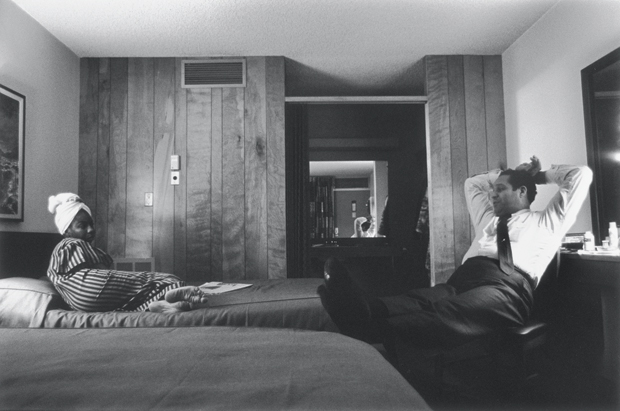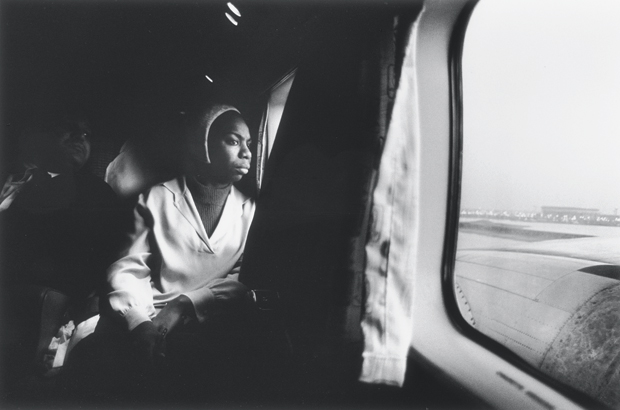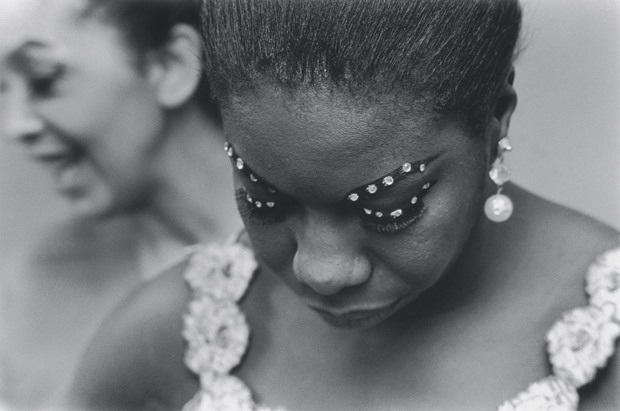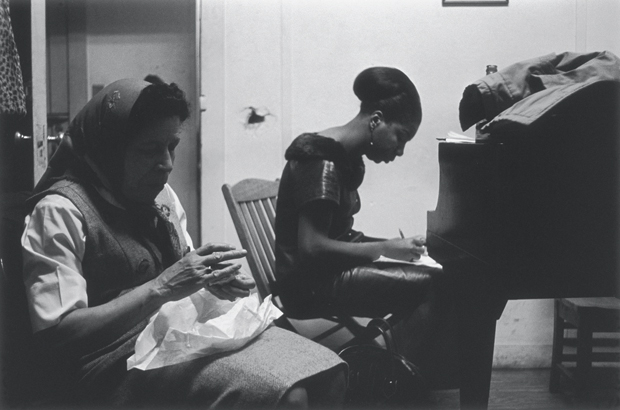We're already hard at work on FADER #79, our annual Icon Issue. You'll have to wait to see who we've chosen this year when the issue hits stands in May. But today, Nina Simone's birthday, we're revisiting our 2006 Icon Issue, featuring stories of Simone's life from her friends, daughter and husband as well as Antony, Alicia Keys, M.I.A and Jill Scott.
Only an artist—a musician—as troubled and fierce as Nina Simone could capture so turbulent an era in American and transcend it, each song—each solitary note—a timeless roar of ecstatic renewal and furious damnation.
AL SHACKMAN (Nina Simone's friend) : Some friends of Nina’s were in New Hope, Pennsylvania in 1957 and on a Saturday night they came and heard a set of mine with my trio, then told Nina that it would be incredible if the two of us played together. Nina reluctantly agreed. I set up on the bandstand and she sat down and just looked at me for a second then went into her first piece without telling me what song it was or what key it was in. But I knew what key it was in—we both had perfect pitch. She started out with “Good King Wenceslas”, but it’s a long introduction to her song “Little Girl Blue”. She started a fugue on it, and I heard exactly what she was doing and came in on my guitar and followed her, playing a third above her like a harmony. Then she looked up. She did like a two-part invention and I played a counterpoint to that and it reached a crescendo and really went right into, “Sit there and count your fingers….” With all the intensity of the music going on, she was singing this little ballad. I was floored. And she was floored too, because she couldn’t lose me. But by the time we got to the downbeat—BAM. It was a lifelong thing. You know, she’s my sister.
She was a Southern girl—that’s the one thing I always saw in her. You know, born in Tryon, North Carolina. She would put on such airs of sophistication in the company of presidents and really important people worldwide, but if she didn’t like something, when we were leaving she’d say, “Aww sheeeit. What was that like? We could have really done something tonight.” Like go hear some music or go dancing.
When I got back from a stint on the West Coast with Burt Bacharach, that’s when our musical relationship got real serious. That’s when Chris White [bass] and Bobby Hamilton [drums] came into the picture. She had met Andrew Stroud, and she married him—they bought a lovely home in Mount Vernon. We were rehearsing so much that I was living with my wife in what Nina called her treehouse, a little apartment above her garage. At that point Andy was managing her career quite well. We’d be rehearsing at her house and she had a rule that if anybody made a mistake you had to repeat the whole thing ten times. And you couldn’t say anything—there’s no such thing as, “But, Nina….”
She would rehearse and rehearse and rehearse, but then, at some point in her life, frankly she was lost and it was difficult to reach her, and at that point she stopped rehearsing. She just had an aversion to other people, so it was just the two of us. I would play guitar, vibes, bass, sitar and conga drums. We did one show at Lincoln Center and I had all these instruments on the stage, running around.
I once told Nina, “No matter what happens, if you’re in trouble, it doesn’t matter where I am in the world, if there’s something going down, I’ll be there within 24 hours.” And I kept my word pretty well. There were times when she called on me and I would go. You know she was famous for not showing up. There were various reasons, and some of them really were manufactured. But she had a condition and, bravely enough, she fought through it. And it got better! One time, really late in her career, she looked at me and said, “You know this is really all we have, isn’t it?” And I said, “Well we have each other and our music and the audience.” And she said, “Yeah, that’s what I mean. They’re really my family now.”
The Village Gate was a hot spot. One night she got on the stage and people were talking and she just sat there at the piano. Then she got up, went to the front and said, “Why don’t you people shut up? Are you involved? Do you want to listen to what I have to say tonight?” She said, “You’re interested in civil rights and equal rights”—and we’re talking about what? 1960?—she said, “Take a bath and put on deodorant if you want equal rights.” Can you imagine that, in 1960, with a good sized black audience listening to that? And they did!
She had a certain dedication to Civil Rights, but not in the way that much of the public saw her commitment. She said, “It’s all well and good, but I’m not gonna get myself killed and I’m not gonna give up my life to please this group or that group. I’m doing what I’m doing; I want to make some money.” Backstage at a benefit, she said, “How much am I gonna get paid?” For a benefit! Somebody said, “Nina, how come you’re not that into Civil Rights?” And she said, “I DON’T HAVE TO BE INTO CIVIL RIGHTS, I AM CIVIL RIGHTS.”
[Percussionist] Babtunde Olatunji invited Nina and I to Africa to this worldwide festival in Nigeria. A group of us were on the plane, excited—we’re talking about a plane full of African-Americans going to their homeland. I think I was the only white person on the plane. So we land at the airport outside of Lagos, and the doors open and suddenly we feel the heat of the jungle and the drums. People had come from all over to greet us; they made a big speech and here’s everybody on the plane, thinking they’re going home. The speech was translated for me and the speech was, “Greetings to our American cousins.” They were saying, “You’re not African, you’re American. You’re our cousins.” But hey! Everybody got over it real quick.
Every version of any given song that Nina played would be different—that’s why she had trouble with different musicians. I would do a set list, you know, say, “I Loves You Porgy” in E flat and suddenly it would be in F sharp and—gulp. She could also improvise a narrative as an introduction to a song—it would be a spoken story that changed depending on how she felt. She would be talking—mostly to women—about how she understood what they were going through. Like “Ne Me Quitte Pas”. Jacques Brel wrote the lyric, “Please don’t leave me, please don’t leave me, ne me quitte pas,” and at one point it goes, “I will even be the tail of your dog.” But she’d sing, “But I won’t be the tail of your dog,” and man—people went nuts.
In the last years, we had a rift. She got so out there, to the point where she wasn’t seeing me anymore, and I was like, “Hello? This is Al. This is your brother.” She was having some bad emotional problems. I was here in Martha’s Vineyard and she was in California in a hospital, recuperating. She phoned me and she said, “Al, I really want to apologize for all the years of pain I’ve caused you.” And I said, “Oh boy. Sometimes there’s pain with the beauty but thank you, Nina, I needed to hear that.” And she said, “Oh I want to introduce you to my nurse here.” He got on the phone—his name was Clifton Henderson—we introduced ourselves, then she took the phone from him and said, “I’m gonna hire him to come back and be my nurse.”
It’s that classic story. He gained more and more power in their home in Southern France and when we started doing concerts again, he was there as her assistant and then her manager. He put in a lot of control and used to give her her medications. She needed to have her medications but it would be too close to the gig. She was like a zombie—all the fire was gone. I was able to put a stop to that kind of thing but I wasn’t around all the time and he started isolating everybody from her. I once tried to search him out with the nurses association in Southern California and they never had him. I think what he was was an orderly. It was frightening. But she was at a point where she needed assistance. This guy Henderson—I got word that he collapsed and died in March, and he had been selling the story of his life with Nina. Selling it for a movie with Mary J Blige, and well, we’re looking into it. They need to know the truth.
At one point Nina was diagnosed with cancer and they did a lumpectomy and it looked like she was okay. I don’t know what happened with medication or whatever because I wasn’t there, but she also suffered a stroke. The medication is a sensitive issue, but I think it really saved her career and in some ways her life. I’ve talked about it a little in the past, just because people didn’t know what she was fighting—the demons she was up against. For a while there Clifton would not let me talk to her. But one time the guys were gone and an American girl was there alone and she let me talk to Nina. I said, “Nina, it’s Al.” I said, “I love you,” and she kind of slurred, “I love you too.” And I said, “I’m gonna come see ya.” And she said, “Okay please.” I called her once more—at this point she couldn’t really answer me—but I was gonna make arrangements to come out and see her. I told them, “You just put that telephone up to her ear,” and they did, and that was the last contact I had with her. But, you know, I hear her everyday.
Al Schackman is Nina Simone’s former guitarist, musical director and friend of over 40 years. In addition to his constant work with Nina, he has played or recorded with Burt Bacharach, Harry Belafonte, the Drifters, Dinah Washington, Carol King, Wynton Kelly, and many more.

SIMONE (Nina Simone's daughter): I remember her and my dad leaving a lot. For the first six years of my life I remember her being the softer one. She didn’t give me a spanking or anything like that, so she was my refuge and I wanted to be around her all the time. One fond memory is of my mother and father doing the jitterbug in the living room. You know how kids just love to see their parents together? It was just a wonderful feeling to watch them in sync, laughing.
The people that I remember the most were Stokely Carmichael, Miriam Makeba, Betty Shabazz. Those are people I also had relationships with, those were my uncles and aunts. Times have changed a lot in terms of parent and child relationships. Children of divorced relationships weren’t really considered affected. It wasn’t talked about back then in the early ’70s, so I just remember one day my father was there and the next day he wasn’t. One day we were living in Mount Vernon and the next day we weren’t. No one explained anything to me and that’s still something that I have to work through. I wish that they had taken at least five minutes of their time just to say, Look, we love you, this is not because of you, we’re just not getting along, we’re just not going to stay together anymore. But that never happened.
Have you heard of Attilah Shabazz? She’s Malcolm X’s eldest daughter. Sometimes people tell me little stories about things I don’t remember and I’m able to put two and two together. She said that at one point her mom was trying to find my mother because I guess it was time for school to start and Betty didn’t know what mom wanted to do. I guess when Aunt Betty couldn’t find my mom she just put me in Montessori with her own children. I was maybe six, and every time the phone rang, I would say, “Is that my mommy?” And my father also told me later on that he didn’t know where I was. I guess he came home, the wedding ring was on the side of the bed and he didn’t know where she’d gone and he didn’t know where I was.
When I was 13 my mother and I got into a big argument because she wanted me to go to boarding school on the Ivory Coast and I just was not feeling that at all. I guess maybe I was just tired of moving. And then she somehow found a school in Switzerland, an international boarding school. Everything was fine, as long as she wasn’t around, and then she decided to come and turn my world upside down. The following year, I had a ticket to New York and we had a three day weekend, and I said to my mom, “You know what? I’m going back to New York to see my dad, and I’m gonna prove to him that he loves me like I’ve been telling you all these years. Or prove to myself that he doesn’t, like you’ve been telling me all these years. But either way we gonna get this straight.” I didn’t tell my father that I didn’t have a return ticket to Switzerland. So I landed on his doorstep, and of course he was happy to see me cause he thought I was only coming for three days, and on the fifth day, he was like, “Well, when are you going back?” And that’s when I had to tell him the real deal.
Make no mistake, the umbilical cord is stronger than logic. Throughout all of this, all I wanted was my mommy, her approval, her love, her support. It was very complicated, but the love was always there, up until the day she died. It’s just that you have to find a way to communicate with one another and respect one another. I could always reach her through music, there were a couple songs that she taught me that we could sing as a duet. I remember one time we were having a…she just…it was a lot of pregnant pauses, and I just started singing. She sat up straighter and she came in with the other part. Once we got done, it was as if that wall was gone. I was grown at that time; I realized at that moment, “Ah-ha!” I knew how to get through all the bullshit.
During the first few years of me making the decision [to pursue singing] and her really having a hard time digesting that and accepting it, she would ask me a lot of questions to try and see where my head was, and to also try to dissuade me. For every argument or every question she had, I had thought it out and I wasn’t afraid. At one point she said, “Well you know people are gonna compare you to me.” And I said, “That’s fine, I don’t have a problem with that, because I can guarantee you that at least 50 percent of them will not be disappointed with what they do hear.” And she’s like, “Well, they’re gonna expect you to play piano.” I’m like, “Well, I don’t.” And then she said, “Well, they’re gonna expect you to sing protest songs.” And I was like, “Well, I can sing your protest songs.” Basically she was saying, You’re gonna have to work really hard and you’re gonna have to bust your butt and you’re gonna be betrayed and you’re gonna be this and that. And I looked at her and I said, “And for any job or for anything you want to be successful at, tell me, which one do you not have to bust your butt at?” So after a while she just realized that it was futile. Then my mother finally saw me in Rent when I was Mimi on the first national tour. She loved it. She stopped questioning a lot of things and started asking me questions about my career.
One day in the early ’90s, I remember talking to a friend of mine about when my mom dies, and I was like, “I don’t want anything.” And he looked at me and he said, “Well, you’re her only child, you have no choice.” I remembered that being a real epiphanous moment for me. I’d been running away from the relationship, because it just seemed like I could never do anything right or couldn’t say anything right, and I just didn’t want any more of that pain. When I realized in that moment that no matter how far I ran I would never be away from it, I said, “You know what? Let’s see how she likes having a relationship with me.” I became more empowered in that moment, because then when I would deal with her, if she was having a bad day, I would say, “You know mom, I love you but I don’t think we need to talk right now. Call me when you’re feeling better.” She became aware of how I was feeling and it was up to her to either make the change, or not. I also think she started to respect me more, not only as a performer but as an individual—and was proud. So she was able, for lack of a better word, to relax. I know she had a lot of insecurity issues. She felt that I was competing with her. And I had to remind her, “Mommy, I’m not trying to take your place, I’m trying to be an extension of you, because you’re wonderful, and you have to know that you’re wonderful.” When my mother passed, for a while I grieved more for the fantasy that I was hoping for and that could never be. It was almost like, “How dare you pass away, before we reach the place that I want us to reach?”
I had a conversation with her three years ago in France, she was eating. She’d had cancer for a while, and she was in chemo and all that. I said, “What are you eating?” And she said, “Oh, some kind of grass,” because she hated eating salads and all that, she called it cow food. I asked her, “Have you lost any weight?” And she said, “Oh yeah, oh my God, I’ve lost a lot of weight.” And in that moment I knew that she was dying, because that’s what cancer does. And six weeks later she was gone.
Simone is the only child of Nina Simone and Andy Stroud. She is a singer and performer, and on April 21 she revisited her mother’s legendary concert at Town Hall on the the third anniversary of her mother’s death.

ANDY STROUD (Nina Simone's husband): I met Nina at the Round Table and we wound up later at the Drake for drinks. At the end of the night, she put a business card in my hand and on the back she had an inscription: “It was very nice to meet you—Nina,” with the date 3/7/61. We kept in touch and dated and it became hot and heavy. Nine months later we were married on December 4, 1961. I found her to be a normal person at that time; I didn’t know what was underlying. Her moods varied a lot when I met her and she was going to the psychiatrist at least twice a week. I discontinued that. I told her, “Hey you’re not gonna have two men telling you what to do.” And she said, “Well, alright. But if you want me to discontinue seeing the psychiatrist, I want you to let him analyze you.” I said okay and went and he gave a good report: “Feet on the ground, square-headed. A nice guy, normal, no problems.” So she said, “Okay, you got a good report, I’ll discontinue.” And we also threw out the gays that were hanging around the apartment. There were some—mostly females—and I said, “We can’t continue this if we’re gonna be married.”
I put the relationship in five-year segments. The first five years were the romantic period. After she had the baby [Simone], she stayed at home for a while. We had the big house in Mount Vernon and we would sit in the dining room and evaluate each other’s potential. I was a lieutenant in the police department and she had this dream of being the first female black classical pianist in Carnegie Hall. We decided that I would get out of the police department and take over her career.
All sorts of people who became famous would visit us, young artists, Broadway people. Langston Hughes and Nina were great friends and they collaborated on the song “Backlash Blues”, which was one of his poems. Jimmy Baldwin was there all the time, hanging out in the Village and the two of them would talk and argue and scream and holler, but they were the best of friends. A couple of times Nina got into her nasty moods and didn’t want to go on stage—we had Langston, Jimmy, myself, all pleading, trying to get her on. Eventually, she would. Nina and Lorraine Hansberry became friends. When she was rehearsing A Raisin In The Sun on Broadway, we used to attend the rehearsals and watch with Sydney Poitier and the rest of the cast. Nina and Lorraine became great friends, they had long discussions on world conditions, race relations, politics. All of these talks began to turn Nina into a devoted protester. Hansberry was a revolutionary—after talking with Lorraine for a couple days at her place up in Westchester, Nina would come home and she’d say, “Let’s go poison the water! Where’s the water supply?!” I’d go, “What the hell are you talking about?!”
She wrote her first protest song in 1964 as a result of the Medgar Evers killing, those three college students killed in Mississippi by the Klan and, ultimately, the four little girls in Alabama. That was the boiling point, she ranted and raved and stomped and ran around the house screaming, howling, sitting at the piano and pounding and came up with “Mississippi Goddam”. After a couple weeks of fuming, she got to the point where she just sat at the piano and I think she wrote that song in one or two hours—it just flowed out.
Nina was a very doting, very loving mother for the first three or four years, but as I say, I take it in five-year cycles. At the end of the fourth year or so she became occasionally despondent and depressed. She began writing letters saying, “Why did I have the baby?” and just questioning everything. At one time she was so concerned about these mood changes that we went to Columbia Presbysterian and she was there for three or four days. They ran every test known to science at the time, trying to pinpoint the reason for all of these mental problems and came up with zilch. Later on I heard in the ’80s —after I was no longer involved—they came up with some sort of brain chemistry imbalance and a certain type of medicine was recommended to stabilize her.
We officially divorced in 1972. We separated from January 31, 1969 until 1970, when we returned from the European tour. She ran off the plane and I didn’t see her for days or hear from her. We had an agreement: I paid child support, but not when the child was out of the country and I had no visitation rights. No one wrote me [when she left]. I had no idea [where she was], at that time there were no letters, and she would call at two o’clock in the morning, complaining and wanting me to join her. Over the years, there were hundreds of letters of begging and pleading, which I never acknowledged or responded to, except in ’76. She had a situation in London with this African manager or associate who almost killed her, strangled her and left her unconscious. Subsequently, she attempted to commit suicide with sleeping pills, was taken to a hospital, revived. A few weeks later she was in an English countryside spa. I got letters and phone calls and everything begging me, and so I finally relented. I took a trip over and, after several days of talking, agreed to represent her in business action only, no personal relationships. So she came back to the United States and I got an apartment for her on Columbus Circle and she walked into the apartment and said, “This is a goddamn open grave.” I said, “Hey, what do you want? These are great accommodations to start, because we haven’t made any money.” She stayed for a while and then she ran off to Barbados.
CTI records wanted to record her at Philharmonic Hall and gave me expense money. Al Schackman and I went to Barbados to bring her back. We found her at a hotel on the beach, deeply in debt. Naturally she was very difficult to handle. We left and came back to New York and did the concert, but CTI went bankrupt and never recorded it. I had schedules, in ’78 and ’79, for concerts across the country. But it was the same old, same old. She had promised me that she would do the right thing, but she was the same old Nina Simone: bitchy, problematic, upset for no reason. You could never satisfy her.
In ’65, she started talking about suicide for the first time and it began to appear in later writings. She attempted it in London, and I think there was another incident, but she became very unstable at times, for no known reason. After her success in ’65, ’66 and ’67 she began to complain of being tired—we were only doing weekend concerts. [One time] I took out the schedule and counted, I said, “You did 30 concerts last year, how in the hell could you be tired?” We were living from concert-to-concert. She wanted to put a swimming pool in the patio, she was talking hundreds of thousands of dollars of refurbishment and upgrading on the house, but she didn’t want to work. I said, “Where are we gonna get the money?” She always held me to account with a little bulletin board in the kitchen where I used to pin up notes like: “This time next year, you’ll be a rich black bitch.” She would get angry and say, “Look, you made this promise.” I said, “Yeah, but unless you wanna go out in the street and turn tricks, we got no money coming in. You gotta do mathematics.”
I was always trying to do what she wanted, but it was impossible. When she started writing protest songs, she would see Aretha and Nancy Wilson doing guest appearances and she would go into a frenzy, like, “Why ain’t I?!?” I said, “Nobody wants you! You can’t scream and holler about killing white people and think they’re going to have you as an entertainer.” I got her on the Johnny Carson show, and you’d think she’d sing “Porgy” or something like that, but she sang something that was totally unacceptable and a waste of time. Harry Belafonte was one of the organizers when [Martin Luther] King had that Selma-to-Montgomery march. Belafonte called when we were at the Village Gate with Art Deluger, Miriam Makeba and Hugh Masakela. Belafonte called and said, “We’re having a celebration festival before they enter Montgomery.” When we got in, everybody was there: Hollywood people, all the black stars, and Nina sang “Mississippi Goddam”. She was in the front line, with her back to the stage, and facing the audience was Martin Luther King, Ralph Bunch and a lot of other well-known people. When she sang, that whole line got up and turned around to face the stage—she was a huge success. In those times, she didn’t show fear, she would get up and get involved and committed and she was ready to die.
Andy Stroud was married to Nina Simone from 1961 to 1970 and was her business manager throughout their union. He continues to release her recordings, and published a book of photos from their marriage.

ANTONY: Nina Simone’s autobiography scared the shit out of me. It was a really healthy lesson for me about the complexity and pathos of an artist that reaches that kind of transcendence—the nuts and bolts of the insanity that leads to someone who can reach out that far. Because to get that high up on the mountaintop you have to have gone through some pretty intense trenches.
My favorite Nina Simone album is Baltimore—it got me through a lot of hard times, particularly “Everything Must Change” and “Music For Lovers”. There’s this one gasp in a live Donny Hathaway recording of “A Song For You”, and it’s the same as the sound in Nina Simone’s voice at the end of “Music For Lovers”. She sings, “And the whole world will smile,” and it’s like the encyclopedia of music in one note. She’s singing of joy and she’s singing from a place of utter despair. She starts out with the song “Baltimore”—she was singing about America like that, from some studio in Amsterdam. So much of her song is one of exile.
My other favorite song of hers is “Compassion”. She’s singing about the boon of song: Because I’ve loved so deeply/ Because I’ve loved so long/ God in his great compassion/ Gave me the gift of song. And then she sings that God gave her the boon of death because she fought so hard—the boon of death! That’s a really hardcore vision from the top of the mountain. When you watch footage of her from Ronnie Scott’s in London, you see her playing with the technical expertise of a master, but with the intuition of the most soulfully connected person. Somehow she managed to combine both of those extremes and encapsulate all the popular forms of music and on into classical and jazz. Covering everything from the Beatles to—have you ever heard her cover of “My Way”? Her fucking cover of “My Way” will make you cry every time you hear it.
She was almost from another planet in terms of the power that she harnessed as a hardcore, hard-boiled black American woman. It’s so complicated being a woman in relation to men and then defending your people from the perspective of the underclass sex. And she is one of the brave few that stared all those demons in the eye and roared like thunder. And of course she was fragmented and cracking. You have to be, to be that brave. That’s why, to me, all of those little stories and gossips about her, none of those details of the pedestrian identity undermine the vision and the endpoint that she reached as an artist and as a visionary. That’s just the path there. You don’t get there by doing what your neighbors think is right. You don’t get there by coloring inside the lines.
The path of the hero is hard earned, but her genius wasn’t in the trauma—it was in her ability to turn experience around and transform it into a sound that people can hang their souls on. She was the voice for so many disenfranchised people. I mean, I’m probably the farthest thing possible from the person she imagined she would reach.
Antony of Antony & The Johnsons performed a stunning cover of Nina Simone’s “Be My Husband” for years, “out of the blissful ignorance and audacity of youth,” as he puts it. For better or worse, it’s no longer part of his repertoire.

M.I.A.: The anger and emotion that Nina channeled to write her songs—the process is exactly the same for me. It’s basically about getting wound up to the point where you feel really helpless. Especially being female—what you can do is already, in your mind, really limited. When I was writing, I’d read about something or hear about something, and sometimes you just can’t get involved in the way that a man can. To be taken seriously straightaway, you have to work at everything a little bit harder. Music seems like the only place where it does feel more equal. If you’re able to articulate what it is you want to say and how strongly you feel about a certain issue, then you have just as much of a chance of being heard as a man.
I think you have to grow up feeling slightly like an outsider to have the balls to turnaround and say what you need to say and stick by it. Like you have nothing to lose. I’ve been through so many different things, but I was just born into thinking like an underdog. Nina is obviously what you grow into being—she set quite a high standard, she seems such a faraway ideal. I just assume that one day you wake up and you just are Nina Simone. You grow up.
Maya Arulpragasam, better known as M.I.A., has a body of work that is both deeply personal and highly political. Like Nina Simone, she remains resolutely independent—creatively and personally.

ALICIA KEYS: In 2004 I went to perform at the Montreux Jazz Festival. The gentleman who runs the festival mentioned that he had a filmed performance of Nina Simone, so he took me into this screening room to watch it. I think it was 1976. She had just come back from Africa at this time and she was very disenchanted with America. All of her emotion, all of her frustration, all of her discontent, all of it was so vivid on that screen. The things that she talked about, her energy, and the way that her fingers played the piano…I was so overcome with grief. Everything she played and sang was really how she felt. It wasn’t like she was trying to make it nice or be politically correct. She didn’t give a shit about that. I was imagining all the things she had to go through, and watching her play the frustration out on the piano—she played for seven minutes without saying anything, she just played. I was knocked out. And after it was over, I walked out in a daze, so in awe of how much she could command and demand of her audience and herself.
She’s brutally honest and I take that with me and I hold that dear. A lot of times I wonder, Where’s our honesty? Where’s our voice? And to me, she’s that voice, she’s that person who would say what other people wouldn’t. She was the person that would not settle. We love her because all of our vulnerability, everything we lack, every way we come up short, she could articulate it. She understood.
Alicia Keys has followed in the footsteps of Nina Simone by using her classical piano training to create two studio albums of passionate, undeniable pop music.
JILL SCOTT: I think every artist has a group of musicians they can hold in their hand and say, “These are the people that make it possible.” For me, Nina Simone is one of those people. I met her about five or six years ago at a show in Philadelphia, and I had the privilege of performing “I Loves You Porgy”. I figured the best thing I could do was be as honest as I could, and just allow the story to do its work. And she seemed to really appreciate it—she got up and walked backstage to find me, with her two huge Italian bodyguards. She said, “You are beauty.” I was like Woowwww! She told me I should leave this country, that they would never see me. I think that’s probably where a little of the bitterness comes in, because I refuse to believe that.
It meant a lot to be able to touch her vocally and physically. She was so very regal: always wearing her hair natural and always accenting her distinctly African features. To be such a classic beauty, a black woman unabashed, and have the world tell you you’re not—the treatment of Nina Simone was rude and disrespectful. And that’s why when she got on stage, she felt like singing the songs she did. She’d turn her back on you, or do whatever she felt like doing. I love that kind of fearlessness. Music today gets so caught up in fantasy. Like Marvin Gaye’s “What’s Going On”, Nina Simone gave us a fearless reality.
A soul singer from Philadelphia, Jill Scott has released four solo LPs.



